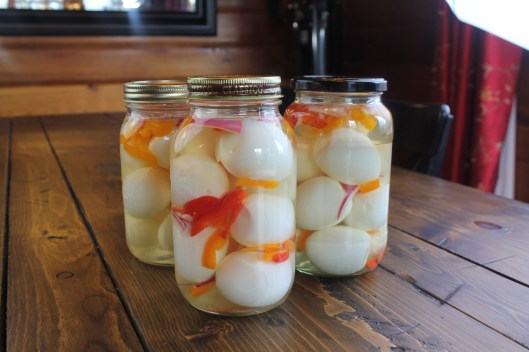
Until recently, my only experience with pickled eggs was peeking through the window of an old pub and spying on the ones in gallon jars that were lined up on the worn wooden counters. It never occurred to me that I could order one just to try it. I’m not a big fan of pickles or sour things so to spoil a perfectly boiled egg by drowning it in vinegar just seemed wrong.
Three years ago we set up a chicken coop and got our first chickens and for the first time in my life I became spoiled with a daily supply of freshly laid eggs. Once you have had this experience there is just no turning back.

When you have your own chickens, you sometimes find yourself in a position of having too many eggs in your refrigerator. We sell our eggs to a few choice friends and neighbors but sometimes people go on holidays or just don’t need eggs that week. As our hens lay around 18-22 eggs per day, keeping the eggs from accumulating in our fridge can be a bit challenge. When I have a surplus, I bake more often, make eggs benedict for breakfast, and crème brulee for dessert. My neighbor has inspired me to try soufflé… I’ll let you know how that goes.
In the meantime, I recently decided to try pickling some eggs. Brian and his parents like pickled eggs, so I thought that if I made them at least someone would eat them. They were quick and easy to make and to my utter shock and surprise, I found that I loved pickled eggs. They are amazing on their own as a snack, chopped up in an egg or chicken salad, or sliced in half and served on a bed of greens. As I don’t like food that is too vinegary I eat them while they’re still mild, after just a few weeks of soaking in the brine.
I thought pickling eggs would be a great way of preserving our extra eggs for those long, dark months when our hens are laying less, however, jars of pickled eggs just don’t last very long in our house.

I have been using Jean Pare’s recipes in her Company’s Coming: Preserves cookbook. She has both a traditional vinegar recipe as well as a sweeter version. I love them both. Try them and let me know what you think.
Pickled Peppers Eggs
12 large hard boiled eggs, shelled
1 each: yellow, red, and green pepper, seeded and cut into thin strips
1 large onion (red, Spanish, or yellow), cut into half rings
BRINE:
2 cups white vinegar (I use white wine vinegar or pickling vinegar)
1 cup water
¼ cup granulated sugar
8-10 whole cloves tied in a piece of cheese cloth (or leave them loose and strain the vinegar as you pour it into your jars)
1 teaspoon sea salt
Arrange eggs a few at a time in a 2-quart jar. Place colored peppers and onions around them as you fill the jar.
Brine: In saucepan, bring all 5 ingredients to a boil over medium-high heat, stirring often. Boil for 5 minutes. Discard spice bag (or strain liquid). Pour over the eggs mixture. Brine must completely cover the eggs completely. Cover and store in refrigerator at least 4 days or more before eating. Keeps in refrigerator at least 6 months. Makes 2 quarts.

Sweet Pickled Eggs
12 large hard boiled eggs
Cold water to cover
1 large onion, cut into half rings
BRINE:
2 cups white vinegar (I use white wine vinegar or pickling vinegar)
2 cups water
½ cup granulated sugar
1 teaspoon sea salt
1 tablespoon mixed pickling spice, tied in a piece of cheese cloth (or leave loose and strain when pouring into the jar)
Arrange eggs and onions in a 2-quart jar.
Brine: In saucepan, bring the first 4 ingredients to a boil over medium-high heat, stirring often until the sugar dissolves. Bring to a boil then remove from heat. Add pickling spice and swish the bag around for 30 seconds. Remove bag. Pour brine over the eggs mixture to within ¼ inch of the top. Seal. Brine must cover the eggs completely. Cover and store in refrigerator at least 1-2 weeks before eating. Makes 2 quarts.

Hi Delena. What a great post. Haven’t heard from you in a while. I’m going to try this recipe as my honey and I are on the Keto lifestyle. Going to use stevia. I’ll tell you how it works out.
Sent from my iPhone
TRISH!!!! Great to hear from you! I lost you on Facebook and am trying to re-friend you. Let me know if you ever want to come out for a visit. I gave you a rain check five years ago- remember? Take care!
The best way to reach me is by email: cabinorganic@gmail.com